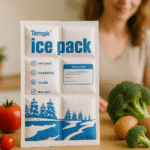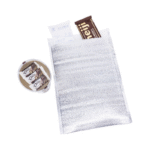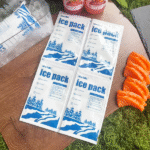If you’re asking “Where can I buy dry ice packs quickly or locally?”, you likely need frozen protection today. The fastest wins are big grocery chains, gas stations on major routes, party/welding supply counters, specialty ice houses, and courier depots with cold-chain kits. Below you’ll find a 90-second chooser, pricing anchors, safety steps, and plan-B paths that cut wasted trips. This guide consolidates and improves three internal drafts for 2025 usability.
-
Pin your fastest local source using a 90-second chooser and dry ice pickup today tactics.
-
Compare formats and costs (blocks vs pellets) with dry ice blocks vs pellets guidance.
-
Right-size your load with a practical how much dry ice do I need estimator.
-
Stay compliant on the move (vehicle ventilation and flying with dry ice rules 2025).
-
Lock in repeat access with scheduled buys and an internal link plan.
Where can I buy dry ice packs quickly or locally—what’s fastest today?
Short answer: Start local and call two places before you drive. Your order of attack: large supermarkets with dry-ice kiosks → highway gas/convenience → party supply → welding/industrial gas counters → specialty ice distributors → courier business counters. Most same-day wins come from supermarkets after 6 pm and welding supply during business hours. Expect $1.00–$3.25 per lb depending on channel and format.
Why this works: Retail coolers handle urgent needs; industrial counters handle pellets, slabs, and bulk with predictable weekday stock. Party/event outlets spike around holidays, so call first. Courier depots are clutch when you must ship tonight and need Class 9 labels. Keep your cooler vented and bring gloves; buy close to pack-out time to minimize sublimation loss.
How to check stock near me in 2–5 minutes
Use a store’s product page if available to switch locations; if not, call the service desk and ask for the “dry-ice cooler” and per-customer limits. For pellets or >20 lb, go straight to welding/industrial gas and request will-call. Bring a hard cooler with a loose lid; never seal CO₂ in an airtight container. If you’ll fly, confirm the 2.5 kg passenger limit before buying.
| Channel (today) | Typical Format | Price Range* | What it means for you |
|---|---|---|---|
| Supermarket | 1–10 lb blocks | $1.25–$2.50/lb | Easiest after hours; call for limits. |
| Gas/Convenience | 1–5 lb blocks | $1.75–$3.25/lb | Late hours; small lots. |
| Welding/Industrial | Pellets/blocks 5–50 lb | $1.00–$2.00/lb | Weekday reliability; ask about account. |
*Regional/seasonal variance. Use as planning anchors.
Practical tips
-
After 6 pm & <10 lb: supermarket → gas station → party store.
-
Weekday 20–50 lb or pellets: welding supply or specialty distributor first.
-
Must ship by air tonight: courier business counter for labels; confirm vented packaging.
Real case: A bakery needed 20 lb on a Saturday. Their supermarket was out, so they phoned a second grocer (held 10 lb) and staged a 10 lb pellet pickup at an industrial counter. Door-to-door: under one hour, zero thaw complaints.
Where can I buy dry ice packs quickly or locally—and confirm stock in minutes?
Direct steps: Make two calls before leaving. Ask: “Do you have dry-ice blocks or pellets now?”, “Price per pound today?”, “Any purchase limits?”, “Until what time can I buy?”, “Do you sell insulated totes or gloves?”. If they say yes, request a 30–45 minute hold if policy allows. This single habit eliminates most blind drives and stock-out surprises.
Expand the plan: When local retail fails, pivot to industrial will-call for format choice (3–9 mm pellets, slabs, airline-cut blocks). For events and weekends, ice houses can bridge gaps and sometimes extend hours. For repeat needs, set a standing order so a weekly allocation is reserved at a target price tier. Keep a supermarket fallback for micro-gaps.
One-call script to secure stock
“Hi—do you have dry-ice blocks or pellets available right now? What sizes and price per lb today? Any per-customer limits? Until what time can I purchase? Do you carry vented coolers or gloves?” If yes: “Could you hold 10 lb for 30–45 minutes under [name]?”
| What to ask | Why it matters | Good answer looks like | Your move |
|---|---|---|---|
| Blocks or pellets? | Blocks hold longer; pellets fill voids. | “5 lb blocks; 9 mm pellets.” | Pick format per payload. |
| Price & limits | Avoid surprises at checkout. | “$1.75/lb; max 20 lb.” | Adjust route or split buys. |
| Cut-off time | Prevents missed windows. | “Until 9 pm at service desk.” | Time your drive. |
How much should you buy—and which format works best?
Quick estimator: For frozen hold, plan ~5–10 lb per 24 hours depending on container and ambient heat. Foam/EPS coolers need less; thin liners need more. Blocks/slabs extend hold; pellets spread cold evenly and fill gaps. Add ~20% buffer for hot routes or frequent lid opens.
Why it works: Dry ice doesn’t melt; it sublimates to CO₂ gas. Rate depends on insulation, load ratio, and access frequency. Dense frozen goods prefer slab lids; mixed sizes love pellet interstitials. For 2–8 °C, use gel/PCM packs—dry ice is far too cold and risks freeze damage. Document your first run with a simple logger and tune the next buy.
Format picker: blocks vs pellets
Blocks/slabs are “slow and steady” for long runs. Pellets are “everywhere at once” for irregular loads. Many teams combine a slab cap plus pellet sides to kill warm corners and speed pull-down. For lab vials or serum, add a spacer for gentler, uniform cold.
| Container | Lbs per 24h | Typical Use | What it means for you |
|---|---|---|---|
| EPS foam shipper | 5–6 lb | Small frozen parcels | Lightest load; top with a slab. |
| Rigid plastic cooler | 6–8 lb | Catering / route runs | Add side strips for corners. |
| Corrugated + liner | 8–10 lb | Budget mailers | Buy closer to pack-out time. |
Practical tips
-
Cap with a slab to leverage cold-air sink; fill with pellets to remove voids.
-
Bag pellets near food; avoid direct contact and freezer shock.
-
Log a pilot box and adjust ±10–20% next run.
Real case: A meal-kit brand swapped a solid block for a quarter-loaf core plus two gel panels and achieved longer two-day holds with ~25% less dry ice and zero thaw complaints.
Where can I buy dry ice packs quickly or locally if I need pellets or blocks?
Go industrial first. Welding/industrial gas counters routinely stock pellets (3 mm/9 mm), slabs, quarter loaves, and airline-cut blocks. You’ll get format control, weighed quantities, and loading help at the dock. If your supermarket is out, industrial will-call is your fastest same-day backup for format-sensitive pack-outs.
Backup options: Local ice companies often run retail counters with weekend hours. Party supply/event rental stores are reliable around holidays. Courier business counters may stock small packs, UN1845 labels, and insulated shippers for urgent air moves—call ahead.
Safety, travel, and flying with dry ice (2025 rules)
Handle & transport: Wear insulated gloves; ventilate your vehicle; never seal dry ice in airtight containers. Store in a vented cooler in a cool, well-aerated room. Let leftovers sublimate in open air—do not flush or bin sealed.
Flying: Typical passenger allowance is 2.5 kg (5.5 lb) of dry ice per person in vented packaging with “Dry Ice / Carbon dioxide, solid” and net weight marked; airline approval required. Cargo limits differ and follow IATA PI 954. Check your carrier’s policy before you buy.
2025 trends: how and where you buy dry ice packs locally is changing
Trend overview (2025): Micro-depots near urban cores extend hours and stock pellets late. Self-service kiosks show live inventory to cut wasted trips. Reclaimed-CO₂ dry ice gains share as teams track footprint. Starter kits pair smart vent lids with Bluetooth loggers so you can prove hold times on gig deliveries and routes. Expect more chains to list 1-lb items with pickup windows.
Latest at a glance
-
Live retail inventory: Fewer blind drives; more hold-for-pickup options.
-
Standardized will-call: Industrial counters streamline pellets/blocks same-day.
-
Hybrid pack-outs: Slab caps + pellet sides reduce warm corners with less mass.
Market insight: Demand keeps rising with food, biotech, and last-mile growth. Buyers blend dry ice + PCM + better insulation to reduce usage per load and to ride out CO₂ supply swings. Long-term supply agreements and scheduled allocations beat spot runs during tight periods.
Frequently Asked Questions
Q1: Where can I buy dry ice packs quickly or locally right now?
Call a large supermarket for 5–10 lb blocks; if out, pivot to welding/industrial gas or a local ice house for pellets/slabs and will-call.
Q2: Is there a fastest order of attack after 6 pm?
Yes: supermarket → gas/convenience → party supply. For weekday daytime and >20 lb, go industrial first.
Q3: How much dry ice should I buy for 24 hours?
Plan 5–10 lb per box per day depending on container and ambient heat; add ~20% for hot routes or frequent lid opens.
Q4: Blocks or pellets—which is better?
Blocks/slabs for longer holds; pellets for even distribution and void fill. Many routes use a slab cap plus pellet sides.
Q5: Can I use dry ice for 2–8 °C?
No. Use gel or PCM packs to avoid freezing; dry ice is −78.5 °C and will over-cool.
Summary & Recommendations
Key points: If you’re wondering where can I buy dry ice packs quickly or locally, the fastest wins are supermarkets after hours and welding/industrial counters on weekdays. Call two locations before you drive, buy close to pack-out, and pick blocks vs pellets to match your payload. Use 5–10 lb per 24 h as a practical starting range.
Next steps:
-
Run the chooser below and make two calls.
-
Bring a vented cooler and gloves.
-
Pilot one box with a logger and tune mass ±10–20%.
-
If you repeat weekly, set a standing order and keep a supermarket fallback.
About Tempk
We help teams move frozen and chilled goods with confidence. From insulated shippers and dry-ice accessories to validation playbooks, we design solutions that deliver predictable hold times without overspending. Our R&D focus and field data let us right-size coolant mass and reduce waste—whether you’re a bakery, biotech lab, or meal-kit brand.
Need a rapid local plan for tonight’s route? Tell us your hours, payload, and cooler type—we’ll estimate pounds, pick formats, and map your fastest pickup options.
























